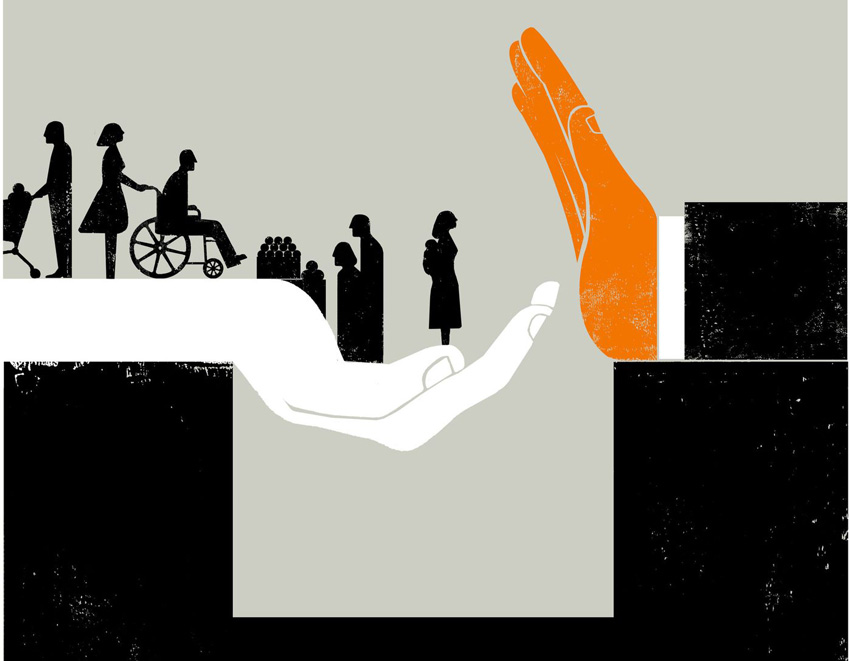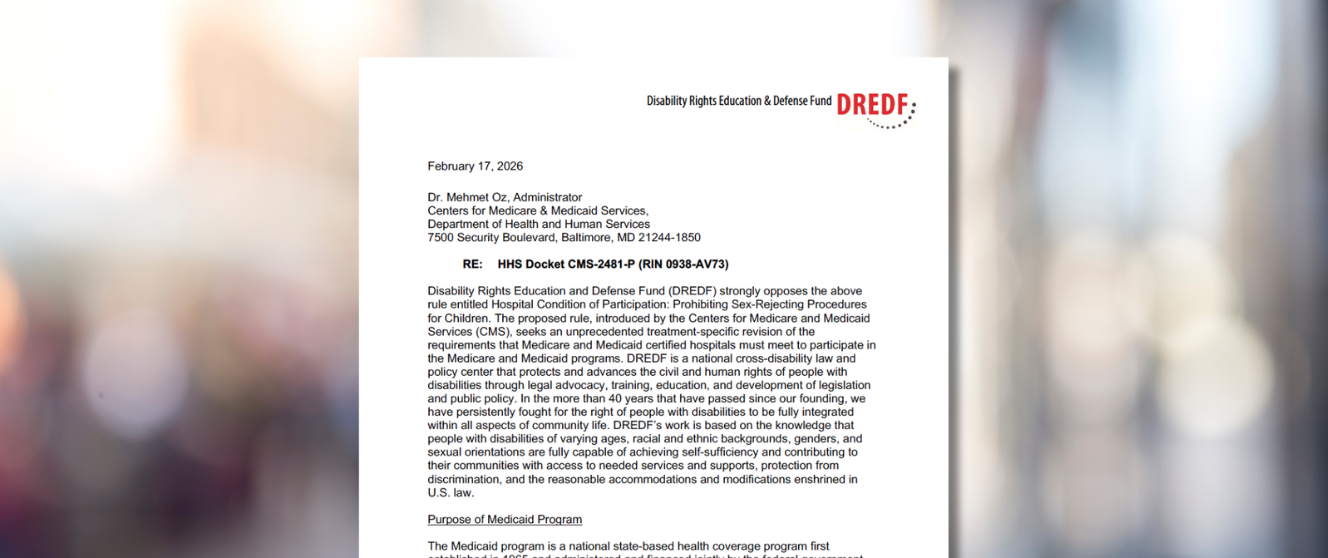
October 10, 2018

With the official publication in today’s Federal Register of the Department of Homeland Security’s (DHS) Public Charge amendments rule, the Administration has committed to the destructive immigration policy it has flirted with for months.
While many countries reserve the right to deny citizenship or entry to immigrants who are deemed likely to use public welfare benefits, since 1996 the U.S. has made the public charge determination based on “the totality of the circumstances” and considered a non-citizen’s age, health, family status, financial status, and educational status/skills.
After a few years, Immigration and Naturalization Service (INS) agents started to deny entry to individuals who had received any public benefits, so federal guidance was issued that said the public charge determination would only consider the receipt, at government expense, of monetary benefits, such as Social Security Income, which had made up more than 50% of an immigrant’s entire income, or long-term institutional care
The 1999 guidance was never codified in regulation. That leaves a gap the Trump administration wants to close by proposing complex regulations that will skew American immigration policy towards wealthier individuals and families while simultaneously discouraging immigrants already residing in the United States from using critical food, health, or housing benefits even when they are eligible.
Here’s what the proposed rules concerning inadmissibility on public charge grounds would do:
- Drastically increase the kind of benefits that would count against an immigrant: non-Emergency Medicaid, Medicare Part D Low Income Subsidy, Supplemental Nutrition Assistance Program (SNAP or food stamps), and Section 8 Housing Assistance and programs.
- Establish standards for immigration officials when they evaluate an individual applicant’s age, health, income, and education. Things like having limited English proficiency, a large family, being under 18 or over 65, or having a physical or mental health condition without private insurance would be counted as negative factors that could affect the immigrant’s ability to work, attend school, or do self-care.
- Elevate the importance of income for those seeking entry or permanent residence since income between at least 125% and 250% of the Federal Poverty Level (FPL), by both the sponsor and the applicant, is one of the few positive factors in the public charge determination. Income above 250% of FPL will essentially rebut a public charge determination based on other factors. 250% of FPL for a family of four is currently almost $63,000/year, and is over $30,300 for an individual.
- Increase the potential use of “public charge bonds.” These bonds will allow some applicants who are otherwise judged likely to become a public charge because of their income level or having a health condition to pay a bond of $10,000 to be admitted, but these applicants (or their sponsors) run the risk of losing the entire bond if any of the benefits listed in the proposed rule are actually used.
- Broaden the application of the public charge test from permanent residence applications to include applications to extend a non-immigrant visa or to change the statues of a current visa (e.g., from a student visa to an employment visa).
It is also important to understand what the proposed rule does not change:
- Non-citizens classified as refugees, asylee, survivors of domestic violence, and permanent residents who apply to become U.S. citizens would not have their status threatened by these changes.
- Some government benefits not counted toward the public charge determination include Medicaid provided for an “emergency medical condition”, certain disability-related services given for educational purposes, disaster and emergency relief, and some education/employment/job training programs.
- Subsidized individual health insurance from the Affordable Care Act (ACA) marketplaces is not included, and the Children’s Health Insurance Program (CHIP) is also not in the rule, though the proposal does specifically ask for public comment on CHIP’s inclusion.
- The proposed rule is not retroactive. Use of all the benefits that have been added to the list, such as Medicaid or food stamps, will not be considered as a public charge matter until this proposal passes all required public comment, is finalized and becomes fully effective.
- Deportation rules have not been changed. When non-citizens in the U.S. draw on the benefits considered in a public charge determination, it potentially affects their eligibility for permanent residence, but that seldom leads to deportation.
DHS’s proposed changes to how the U.S. makes public charge determinations would be deeply harmful to immigrant families. Adding necessities like food, housing and healthcare to the list of public charge benefits, and using different timelines and percentage calculations in public charge determinations—depending on the type of benefit and when a permanent residency application is made—will create a “chilling” effect on all non-citizens far beyond the 2.5% of immigrants that DHS estimates will drop out of benefit programs they are eligible for.
The last time public benefit restrictions were imposed on immigrants in 1996, it resulted in high levels of disenrollment. Food stamp use by non-citizen families dropped 43% in the 4-year period before and after the change in law, while refugee use of food stamps and Medicaid decreased by 60% and 39% respectively within 2 years of the law’s passage, even though the law made refugees exempt.
Most immigrants are not eligible for public benefits until they have had their green cards for five years and the public charge determination does not apply to green card holders who either seek renewal of their green cards or citizenship. Over 30 states extend Medicaid benefits to lawfully present children and pregnant women who are not necessarily green card holders yet, and non-green cardholders with sufficient work history will have earned Medicare Part D benefits and could qualify for the Low-Income Subsidy. The proposed rule does not list “making immigrants eligible for public benefits fearful of applying for them” as an explicit goal, but it is easy to see that desired effect written between the lines. Individual immigrants and families, including refugees and asylum seekers who are not even subject to public charge determinations, will receive only the message that non-citizens who apply for public benefits will suffer consequences.
Furthermore, it stands to reason that since the proposed rule applies the public charge test to individuals rather than households, non-citizen parents might try to obtain Medicaid benefits or food stamps for a citizen child with a disability who was born in the U.S., but would be fearful of applying for Medicaid, food stamps, or housing benefits for themselves even in a time of need, for example after a job loss or a heart attack. It is doubtful that many families would be willing to run those kinds of risks under an administration that has already demonstrated its willingness to separate children from their parents.
For those who have not yet applied for their green cards, and especially the over 40% of green card applicants seeking to immigrate to be with their families, the proposed rule will also have a negative effect. These applicants tend to make lower-incomes, are older, less educated, and likely to rack up “negative factors” in the eyes of immigration officials who have a lot of discretion to take an applicants’ “totality of circumstances” into account.
If these immigrants cannot prove that they have financial resources above 250% of FPL, it is difficult to see how the proposed rule’s directive to calculate factors perceived as negative will be overcome. This is particularly telling when we consider that almost 2/3 of recent Chinese immigrants, and over 2/3 of Mexican immigrants, fell below the proposed 250% threshold. Combined with the Trump administration’s moves to restrict immigration overall, it is easy for foresee how permanent residency applicants will, in effect, be filtered out by a “wealth test” that flies in the face of the promises enshrined on the Statue of Liberty.
While the proposed rule is an attack on immigrants, DREDF recognizes it is also a part of ongoing attacks on people with disabilities, whether they are citizens or not. When the U.S. passed laws such as the Americans with Disabilities Act of 1990, it refuted centuries of harmful stereotypes about the worth, contributions, and future potential of people with disabilities. Attempts to dismantle the Medicaid program, ongoing sabatoge of the Affordable Care Act and its crucial protection of private coverage for people with pre-existing conditions, and approval of Medicaid conditioned on work requirements all threaten the healthcare people with disabilities need to maintain their health and live productive independent lives in the community.
The Trump administration seeks to superimpose a convenient fictional division between “truly disabled’ individuals who cannot work and are deserving of welfare, and everyone else who enjoys perfect health and should be denied public programs. However, real life is not that neat. Real life has plenty of people with chronic conditions, episodic disabilities, and acquired disabilities who can and do work when they can, but need access to healthcare to remain productive. Real life has people with significant disabilities who succeed in school, build careers, raise beautiful families, and contribute to America’s social, cultural, political, and economic life, and who also may, but not necessarily, need temporary assistance in terms of housing, food, healthcare benefits, or social security.
It should not be surprising that this administration seeks to extend the dualistic way it treats Americans with disabilities, and non-citizens, by attempting to assess one’s worth based on income, and linking the future potential of every immigrant to how much money they make. It also sets an impossible expectation: that those immigrants deemed acceptable will never get in an accident, need help with housing, food or healthcare, and never acquire a disability or have a child with a disability.
It is telling that DHS actually forecasts multiple negative health outcomes arising from this rule becoming law: reduced health outcomes for pregnant women, infants and children, increased use of emergency room care as preventive care and chronic care is delayed, lowered vaccination and a resulting increase in communicable diseases across the U.S. population, income and housing instability, less educational attainment, and safety net providers uncompensated for care. DHS apparently sees these outcomes as necessary costs for achieving “self-sufficiency” among immigrants. What DHS never explains is that even as they wave the flag of self-sufficiency with one hand, they are swiftly grabbing back the tools for achieving it with the other hand.
DHS must receive public comments on its proposed public charge rule until December 10. DREDF will be submitting a letter on how the rule is based on stereotypes and unfairly impacts people and families living with disabilities, both those immigrants who have already contributed for years to this country, as well as those who seek to hone their talents and abilities on the U.S.’s level playing field for people with disabilities. Please join us in telling your story and making your voice heard.

